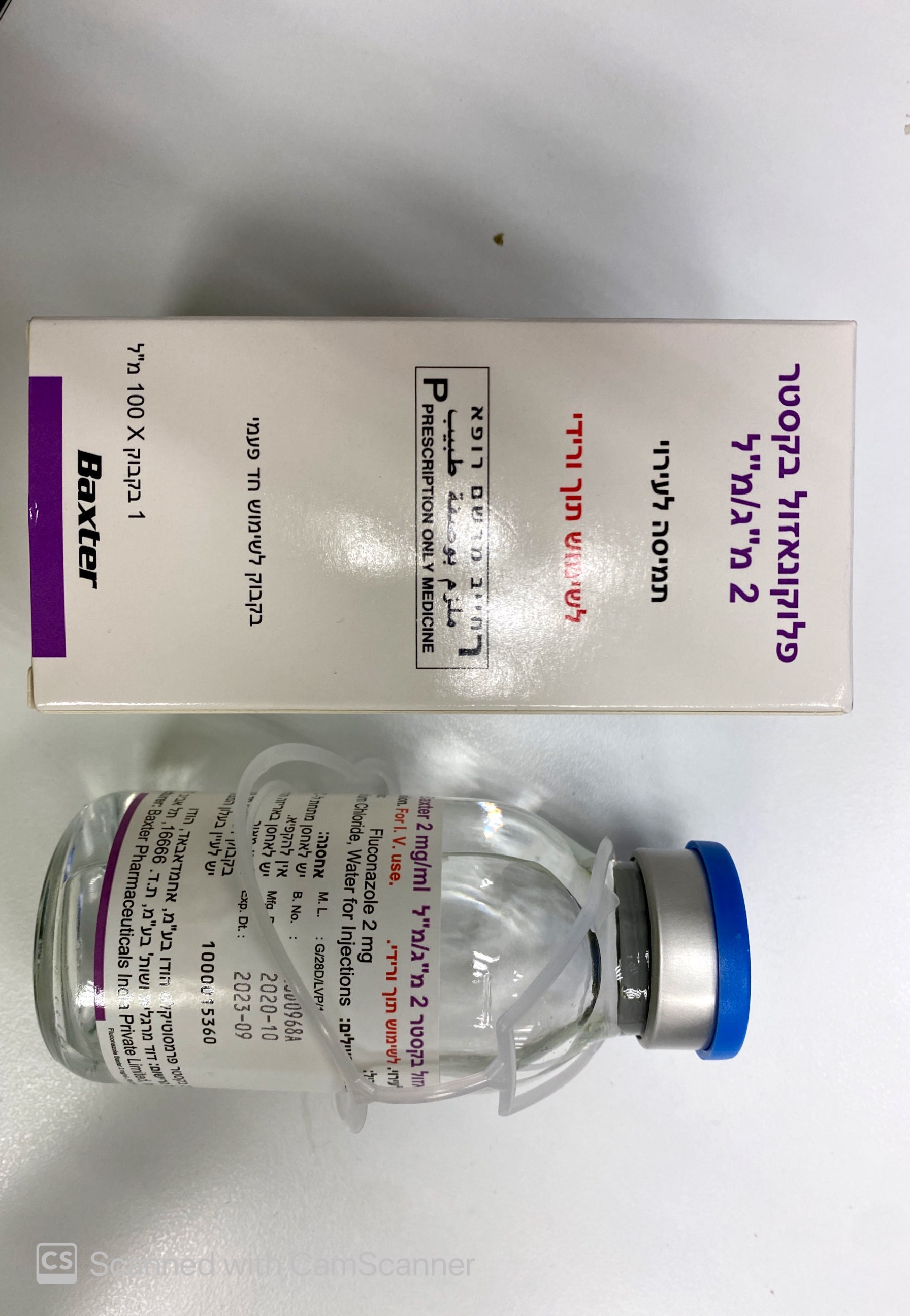Quest for the right Drug

פלוקונאזול בקסטר 2 מ"ג/מ"ל FLUCONAZOLE BAXTER 2 MG/ML (FLUCONAZOLE)
תרופה במרשם
תרופה בסל
נרקוטיקה
ציטוטוקסיקה
צורת מתן:
תוך-ורידי : I.V
צורת מינון:
תמיסה לאינפוזיה : SOLUTION FOR INFUSION
עלון לרופא
מינוניםPosology התוויות
Indications תופעות לוואי
Adverse reactions התוויות נגד
Contraindications אינטראקציות
Interactions מינון יתר
Overdose הריון/הנקה
Pregnancy & Lactation אוכלוסיות מיוחדות
Special populations תכונות פרמקולוגיות
Pharmacological properties מידע רוקחי
Pharmaceutical particulars אזהרת שימוש
Special Warning עלון לרופא
Physicians Leaflet
Pharmacological properties : תכונות פרמקולוגיות
Pharmacodynamic Properties
5.1 Pharmacodynamic properties Pharmacotherapeutic group: Antimycotics for systemic use, triazole derivatives, ATC code: J02AC01. Mechanism of action Fluconazole is a triazole antifungal agent. Its primary mode of action is the inhibition of fungal cytochrome P-450-mediated 14 alpha-lanosterol demethylation, an essential step in fungal ergosterol biosynthesis. The accumulation of 14 alpha-methyl sterols correlates with the subsequent loss of ergosterol in the fungal cell membrane and may be responsible for the antifungal activity of fluconazole. Fluconazole has been shown to be more selective for fungal cytochrome P-450 enzymes than for various mammalian cytochrome P-450 enzyme systems. Fluconazole 50 mg daily given up to 28 days has been shown not to effect testosterone plasma concentrations in males or steroid concentration in females of child-bearing age. Fluconazole 200 mg to 400 mg daily has no clinically significant effect on endogenous steroid levels or on ACTH stimulated response in healthy male volunteers. Interaction studies with antipyrine indicate that single or multiple doses of fluconazole 50 mg do not affect its metabolism. Susceptibility in vitro: In vitro, fluconazole displays antifungal activity against most clinically common Candida species Date: 31/03/21 Baxter Pharmaceuticals India Private Limited (including C. albicans, C. parapsilosis, C. tropicalis). C. glabrata shows a wide range of susceptibility while C. krusei is resistant to fluconazole. Fluconazole also exhibits activity in vitro against Cryptococcus neoformans and Cryptococcus gattii as well as the endemic moulds Blastomyces dermatiditis, Coccidioides immitis, Histoplasma capsulatum and Paracoccidioides brasiliensis. Pharmacokinetic/pharmacodynamic relationship Pantone In animal studies, there is a correlation between MIC values and efficacy against experimental mycoses due to Candidaspp. In clinical studies, there is an almost 1:1 linear relationship between the AUC and the dose of fluconazole. There is also a direct though imperfect relationship between the AUC or dose and a successful clinical response of oral candidosis and to a lesser extent candidaemia to treatment. Similarly cure is less likely for infections caused by strains with a higher fluconazole MIC. Mechanisms of resistance Candida spp have developed a number of resistance mechanisms to azole antifungal agents. Fungal strains which have developed one or more of these resistance mechanisms are known to exhibit high minimum inhibitory concentrations (MICs) to fluconazole which impacts adversely (5) efficacy in vivo and clinically. There have been reports of superinfection with Candida species other than C. albicans, which are Pantone often inherently not susceptible to fluconazole (e.g. Candida krusei). Such cases may require alternative antifungal therapy. Breakpoints (according to EUCAST) Based on analyses of pharmacokinetic/pharmacodynamic (PK/PD) data, susceptibility in vitro and clinical response EUCAST-AFST (European Committee on Antimicrobial susceptibility Testing- Size of Artwork (In mm) : 600x175 subcommittee on Antifungal Susceptibility Testing) has determined breakpoints for fluconazole for Candida species (EUCAST Fluconazole rational document (2007)-version 2). These have been divided into non-species related breakpoints; which have been determined mainly on the basis of PK/PD data and are independent of MIC distributions of specific species, and species related GSM of Paper/Board : 60 GSM breakpoints for those species most frequently associated with human infection. These breakpoints are given in the table below: Pantone Antifungal Species-related breakpoints (S≤/R>) Non-species Plant Location : Injectable related Artwork Control Key No.: A breakpoints Artwork Req. No: 27737 S≤/R> Candida Candida Candida Candida Candida (4) albicans glabrata krusei parapsilosis tropicalis Fluconazole 2/4 IE -- 2/4 2/4 2/4 Language : English S = Susceptible, R = Resistant A. = Non-species related breakpoints have been determined mainly on the basis of PK/PD data and are independent of MIC distributions of specific species. They are for use only for organisms that do not have specific breakpoints. -- = Susceptibility testing not recommended as the species is a poor target for therapy with the Pantone medicinal product. IE = There is insufficient evidence that the species in question is a good target for therapy with the medicinal product.
Pharmacokinetic Properties

פרטי מסגרת הכללה בסל
התרופה תינתן: 1. לטיפול בחולה הסובל מקריפטוקוקוזיס, כולל דלקת קרום מוח קריפטוקוקאלית. 2. לטיפול בחולה הסובל מקנדידיאזיס מוקוזאלית. 3. לחולה העובר השתלת מוח עצם, או מטופל בכימותרפיה ציטוטוקסית או מטופל בהקרנות - לצורך טיפולי או מניעתי של קנדידיאזיס.
מסגרת הכללה בסל
התוויות הכלולות במסגרת הסל
| התוויה | תאריך הכללה | תחום קליני | Class Effect | מצב מחלה |
|---|---|---|---|---|
| לחולה העובר השתלת מוח עצם, או מטופל בכימותרפיה ציטוטוקסית או מטופל בהקרנות - לצורך טיפולי או מניעתי של קנדידיאזיס. | 01/03/2002 | |||
| לטיפול בחולה הסובל מקנדידיאזיס מוקוזאלית. | 01/03/2002 | |||
| לטיפול בחולה הסובל מקריפטוקוקוזיס, כולל דלקת קרום מוח קריפטוקוקאלית | 01/03/2002 |
שימוש לפי פנקס קופ''ח כללית 1994
Oropharyngeal and esophageal candidiasis, cryptococcal meningitis
תאריך הכללה מקורי בסל
01/01/1995
הגבלות
תרופה מוגבלת לרישום ע'י רופא מומחה או הגבלה אחרת
מידע נוסף
עלון מידע לרופא
11.07.21 - עלון לרופאעלון מידע לצרכן
לתרופה במאגר משרד הבריאות
פלוקונאזול בקסטר 2 מ"ג/מ"ל